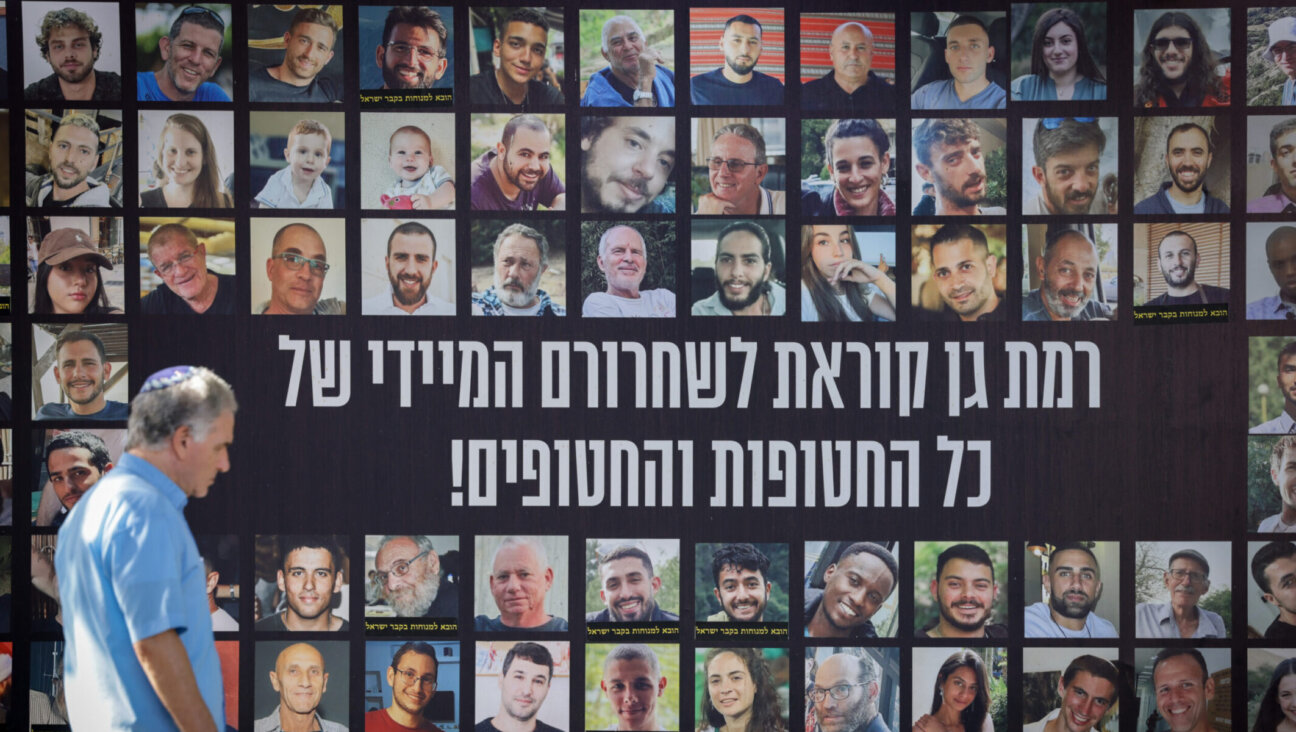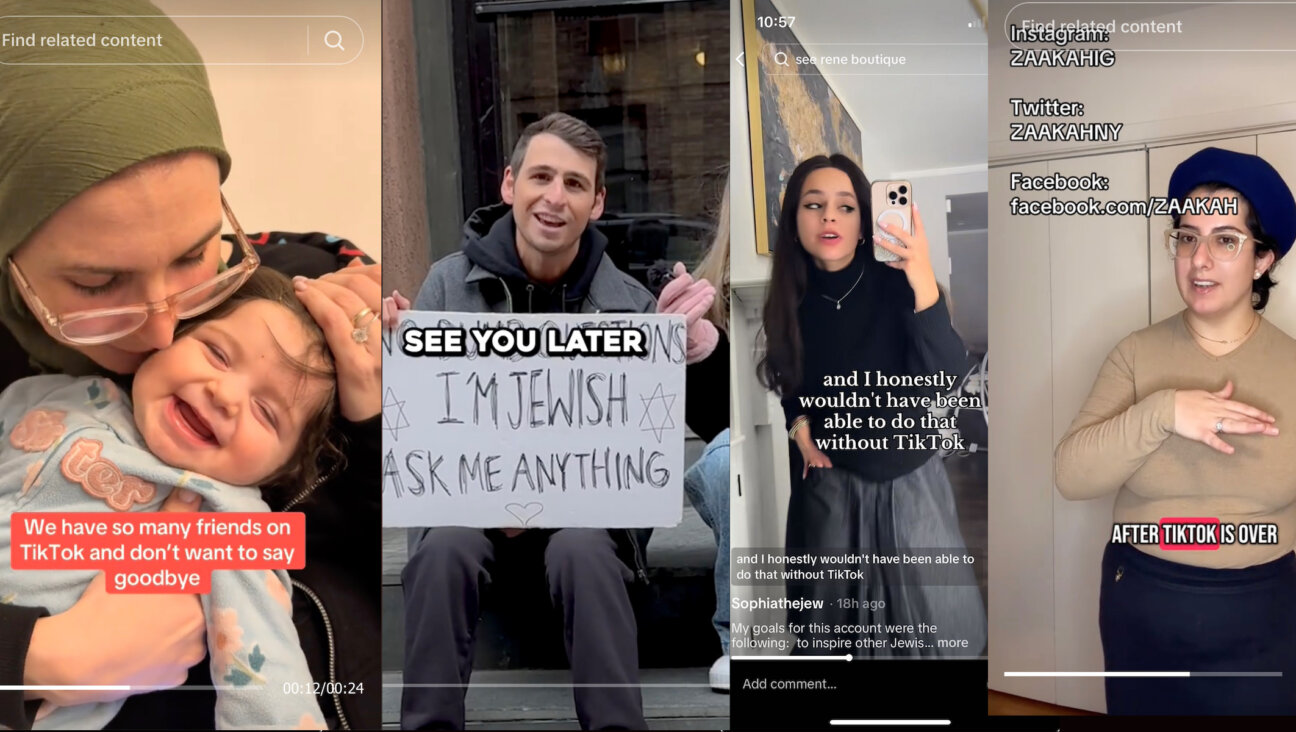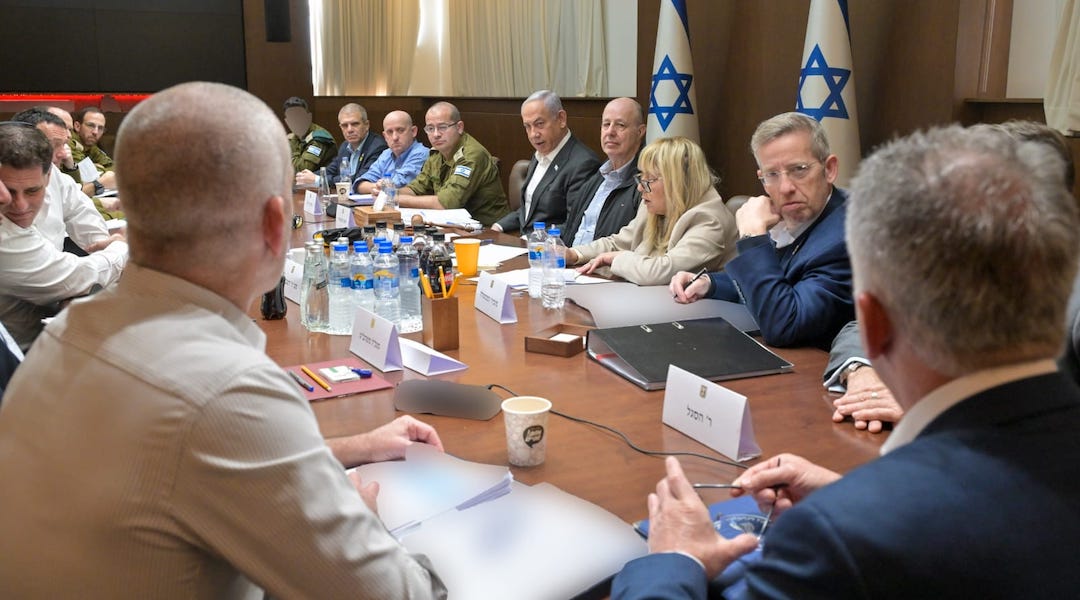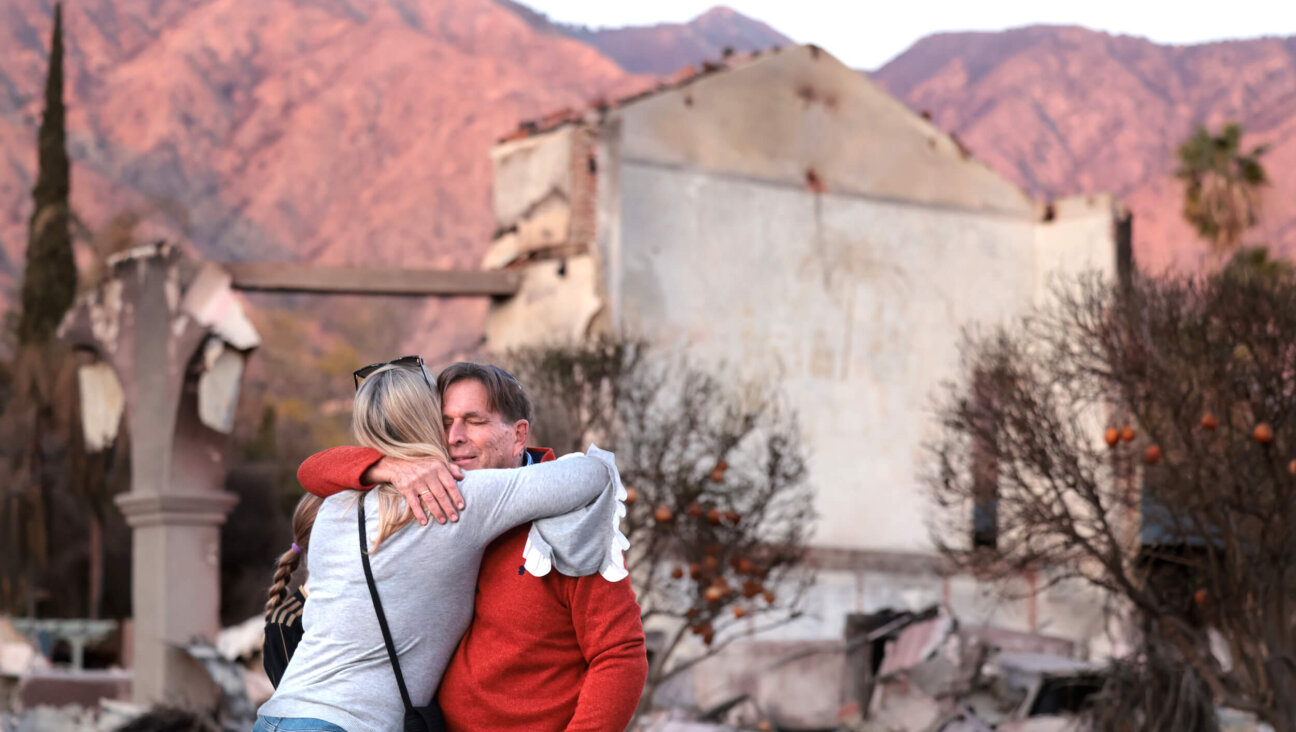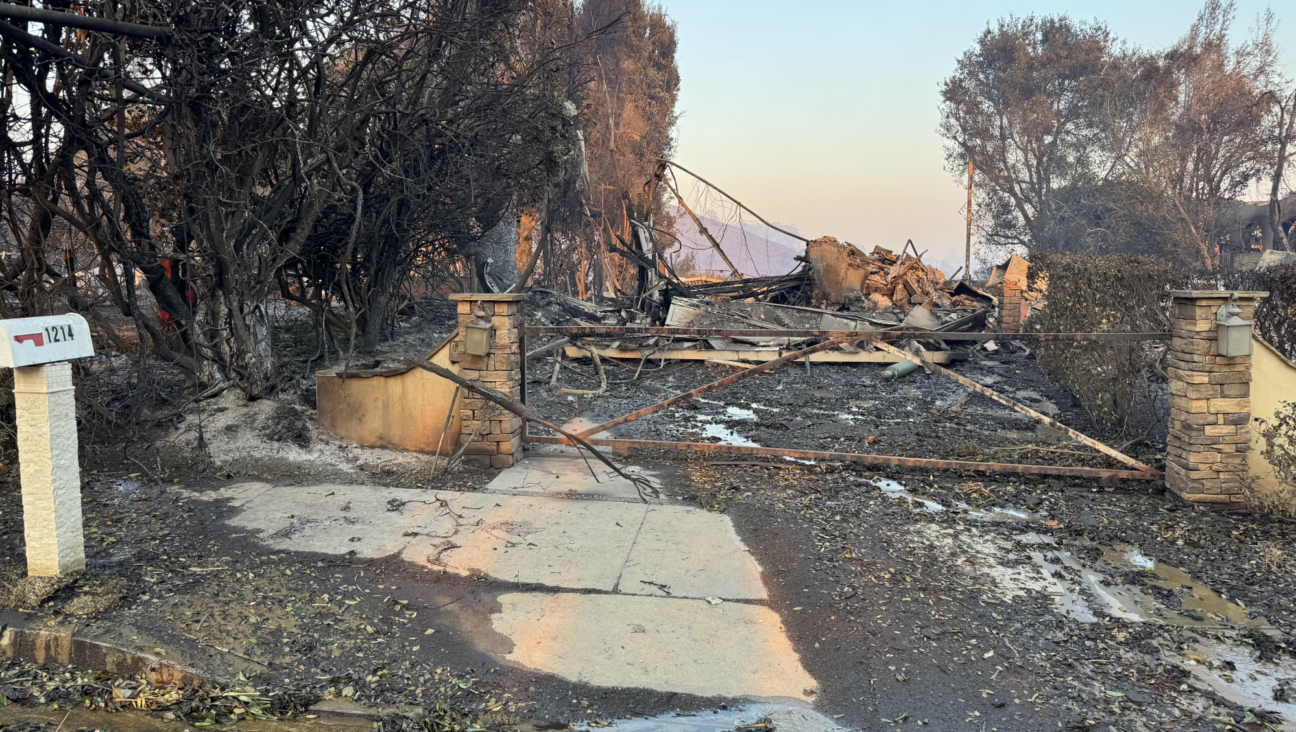Antisemitism and protests in the United States trigger PTSD in Holocaust survivors
“A lot of these fears were still there under the surface, and now they’re coming back up,” said the director of a group that helps survivors
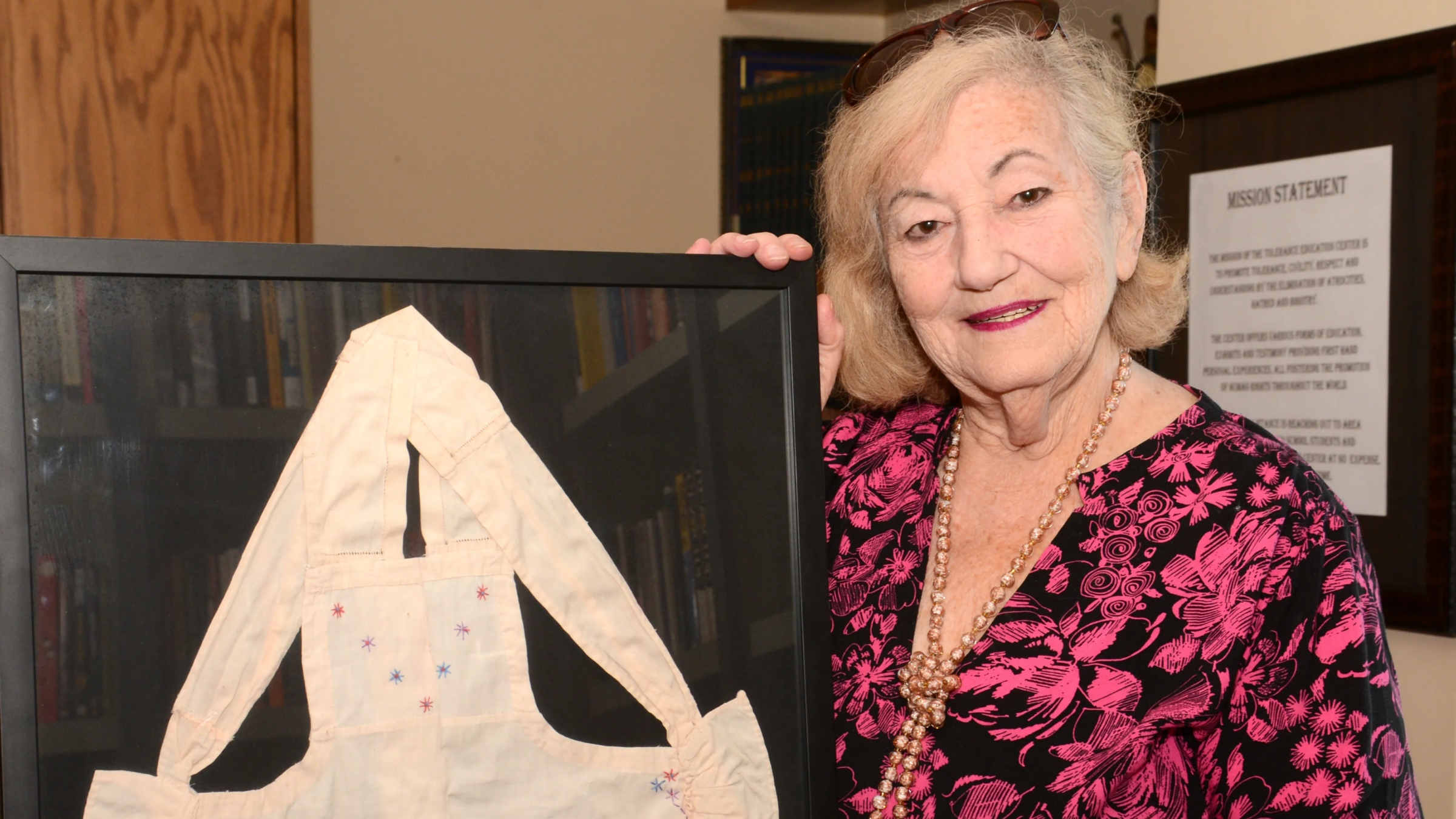
Holocaust survivor Goldie Jacoby holds an apron her mother made for her 6th birthday while the family was hiding in a barn to survive the Holocaust. (Courtesy/Blue Card)
(New York Jewish Week) — After surviving the Nazis in her childhood, Goldie Jacoby has sought strategies to manage post-traumatic stress disorder, such as studying psychology and speaking about her experiences.
When Hamas attacked Israel 10 months ago, she broke down.
“When Oct. 7 happened, it got me totally in shock. I sat down and I didn’t want to get up,” Jacoby, now 87, told the New York Jewish Week. “I was all by myself and I was crying nonstop. It brought me right back to where I was at that age and the fear.”
Her PTSD has long been tied to stimuli including small spaces, like doctor’s offices, that remind her of the barn stall in Poland where she and her family hid for three years. Another trigger is the green uniforms of highway patrol officers, which remind her of Nazis. Now, another trigger has emerged: the surge in antisemitism in the United States since Oct. 7.
“Every time that I put on the TV and I see the fights, fist fights, I feel like, ‘What can I do? How can I stop this?’” she said.
“I’m afraid this is happening all over. I cannot believe that the whole world participates in Jew hatred,” she said. “I cry a lot at night because it really affects me badly.”
The violence of the Oct. 7 attack triggered some survivors around the world, and in the 10 months since, antisemitism in the United States has reminded survivors of childhood persecution, causing symptoms of PTSD including fear, social isolation and nightmares, said Masha Pearl, the executive director of the Blue Card, a New York City-based nonprofit that supports survivors, including Jacoby.
“As much as time has gone by, and decades have gone by, a lot of these fears were still there under the surface, and now they’re coming back up,” Pearl said.
Antisemitism has spiked in the United States since Oct. 7, according to the Anti-Defamation League and local crime statistics. Incidents include physical attacks, and protests that many Jews view as antisemitic.
Reactions among survivors vary, said Eva Fogelman, a psychologist who does therapy with survivors. She estimated that around 30% of survivors experience PTSD, while others are largely unaffected.
Pearl said the Blue Card does not have specific data on the post-Oct. 7 period but has been speaking with survivors and experts in the field about the issue and is planning an empirical study. She said the Blue Card has seen an increase in survivors seeking therapy and other services the group provides aimed at improving mental health, such as mood-boosting lights.
In the United States, the spike in antisemitism has caused shock “at what’s happened to the country that gave them a sense of freedom to live as Jews,” Fogelman said, with many fearing for the future of their grandchildren. Fogelman and Pearl both said many survivors are glued to the news since Oct. 7, exacerbating their fears.
“PTSD symptoms may have been dormant for many years for many Holocaust survivors, but it got triggered as a result of what is happening both in Israel and in America and elsewhere,” Fogelman said, describing survivors suffering from flashbacks and staying at home due to fear and anxiety.
The early lives of survivors plays a a key role in how they respond to triggers, with individuals reacting more strongly to incidents similar to their personal experiences as children or those of their parents. Those who came from Germany and Austria are more triggered by anti-Israel street protests that remind them of Nazi rallies, while survivors from Eastern Europe are more distressed by incidents of violence against Jews, which typified the Holocaust era there, Fogelman said.
“When they see or read that a Jew got beaten up, that is a trigger for the antisemitism that they experienced, physically and emotionally, growing up in Eastern Europe,” Fogelman said.
Jacoby, who was born in 1937 and grew up in Katowice, Poland, falls into that category, with violence against Jews reminding her of her childhood. She witnessed Nazis murdering her grandparents during a round-up of Jews in Poland in 1942, and contemporary attacks recall incidents like an attack on her cousin that year.
One Sunday morning, 5-year-old Jacoby was playing with a ball in front of her aunt’s house in the town of Frysztak, Poland, when a group of children ran out of a church across the street as it finished services.
“The children ran out, screaming ‘Dirty Jew, dirty Jew,’ and throwing stones at us,” Jacoby said. “My little cousin, the boy cousin, was hit in the head with a rock and [was] bleeding and started crying.”
The incident is Jacoby’s earliest memory. She fears that it will repeat.
“What I have seen, no human being should ever see, never mind a child. Babies thrown against a wall, thinking I would be next, my grandparents hit with a rifle butt and dying right in front of me,” Jacoby said. “It’s unbelievable when you hear my story that people can do this to other people. It’s the worst of the worst and it’s going to happen again.”
“I am petrified of what’s happening, I am just terrified because it’s just antisemitism rearing its ugly head again,” she said.
Jacoby survived the war by hiding in the Polish farmer’s pig sty for three years, starving and filthy, with other members of her family. At one point, the adults poured a bucket of gasoline on Jacoby’s head to try to kill lice in her hair, she said.
After the war, she immigrated to New York, married another survivor, and moved to Los Angeles in 1954, then to Palm Springs, California, where she still lives. She said she never felt fully comfortable in the United States, and fears for the country due to the current upsurge in antisemitism.
Fogelman said the best remedy was for survivors to gather with others, especially fellow survivors.
“The best way to cope is not be alone, to be with people, to go to synagogue, to go to Jewish social events, to be with others, not to isolate yourself,” she said, also urging traumatized survivors to seek psychological care.
She also recommends that those with PTSD refrain from following the news too closely to avoid reminders and to find other pursuits that can serve as a distraction.
She urged survivors to “engage in some kind of an activity to take their mind away from constantly thinking about, whether it’s Israel, whether it’s the antisemitism.”
Sami Steigmann, a survivor who lives in Manhattan, said he was able to cope with the trauma of the war by educating others. Steigmann, born in 1939 in what is now Ukraine, was subjected to Nazi medical experiments and starvation during the Holocaust. He does not remember the experiences but has suffered from the effects, including physical pain and nightmares.
“I am doing something about it. I am not on the sidelines, I am educating the next generation. That allows me not to be stuck in the past,” he said, explaining that he tries to speak with protesters who oppose Israel. “The ones that are talking are able to cope better with what’s happening today. The ones that are not talking, they need help.”
Many survivors, such as his parents, did not seek therapy for their PTSD because their generation was “not comfortable going to therapy,” he said.
“They have that mentality that you are not to show weakness or go to a therapist,” he said. “A number of them might not even be aware that they have PTSD.”
Jacoby struggled after her move to New York, where she was subjected to bullying, had difficulties with the language and was the victim of an assault at age 18 while she was pregnant. She never attended therapy, like other survivors in her circle, because it was not widely available at the time, she said. Instead, she studied psychology to better understand herself. She gets upset when people are late for meetings, for example, and later understood that her reaction triggered a memory of being left alone in the Polish farmer’s barn as a child, fearing abandonment.
“Now I know why I am the way I am,” she said. “I have a lot of triggers and they’re really bad but I reasoned them out because you can’t live like that.”
She also channels her experiences into speaking engagements, including at college campuses. She is “outraged” by the anti-Israel protests at colleges, she added, and sees her speaking engagements as a remedy for antisemitism on campuses.
“I want the world to know that this cannot happen again,” she said.
A message from our Publisher & CEO Rachel Fishman Feddersen

I hope you appreciated this article. Before you go, I’d like to ask you to please support the Forward’s award-winning, nonprofit journalism so that we can be prepared for whatever news 2025 brings.
At a time when other newsrooms are closing or cutting back, the Forward has removed its paywall and invested additional resources to report on the ground from Israel and around the U.S. on the impact of the war, rising antisemitism and polarized discourse.
Readers like you make it all possible. Support our work by becoming a Forward Member and connect with our journalism and your community.
— Rachel Fishman Feddersen, Publisher and CEO








